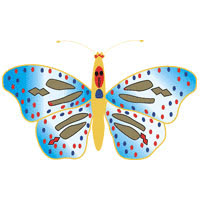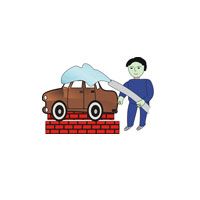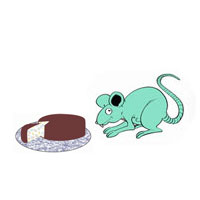|
موضوعات
آخرین مطالب آرشيو وبلاگ
پيوندها
نويسندگان آموزش زبان انگلیسی ELC English Learning Club 5 / 7برچسب:, :: :: نويسنده : S.Alidadi
21 / 6برچسب:, :: :: نويسنده : S.Alidadi
11 / 6برچسب:, :: :: نويسنده : S.Alidadi
2 / 6برچسب:, :: :: نويسنده : S.Alidadi
3 / 6برچسب:, :: :: نويسنده : S.Alidadi
دانلود کتاب آموزش گرامر زبان انگلیسی-نویسنده سعید عنایت پور منبع:www.mihandownload.com
20 / 6برچسب:, :: :: نويسنده : S.Alidadi
در زبان انگلیسی می توانیم با اضافه کردن ful یا y به دنبال بعضی از اسم ها آنها را به صفت تبدیل کنیم
نکته: 1-صفت قبل از اسم بکار می رود 2-بعد از افعال ربطی am,is, are,was,were,seem,look و... صفت بکار می رود
This cloudy sky shows that we may have a rainy day
Your room is so bright and sunny 13 / 6برچسب:, :: :: نويسنده : S.Alidadi
Correct sentence with picture
I teach/study children
study teach
Butterflies have/eat two wings
eat have

The children play/swim in the park
swim play
 There are stars/cars in the sky
cars stars
 The mouse eats/is the cheese
is eats
The postman rings/bites the doorbell
bites rings
 I drive/sing the bus
sing drive
 Dad washes/paints the car
paints washes
 The boy is laughing/sitting
laughing sitting
 I paint/clean pictures
paint clean
17 / 6برچسب:, :: :: نويسنده : S.Alidadi
ترتیب قرار گرفتن صفات در جمله
determiner+quality+size+color+nationality+material+noun
اسم+اسم جنس+ملیت+رنگ+اندازه+کیفیت+پیشرواسم(حرف تعریف,عدد)
a nice long red French cotton blouse The young English teacher bought a large white cotton shirt This beautiful Persian carpet is very expensive
20 / 6برچسب:, :: :: نويسنده : S.Alidadi
Choose the correct answer
Identify the tense & select the correct verb
I like/likes/liked chocolates Like My friend has/have a car They are playing/played/play football He went/go/gone to a park They have played/has played the game He is reading/read a book He is/am a good boy The baby is crying/cried/cry The phone was/were ringing Mother cooks/cooking food for me I have written/was written/has written a letter I have posted/posting the letter
He has stolen/stealing my pen She broke/break the glass What are you doing/do/does? Where are/was/is you?
He speaks/was speak clearly I have heard/hear it before They have been studying/has been studying for two hours I will do/doing this work Let us play/played play He will come/came here tomorrow His wife never cooks/ cook
18 / 6برچسب:, :: :: نويسنده : S.Alidadi
27 / 5برچسب:, :: :: نويسنده : S.Alidadi
Future TenseThe future simple verb tense uses the auxiliary verb "will" and a main verb.
26 / 5برچسب:, :: :: نويسنده : S.Alidadi
25 / 5برچسب:, :: :: نويسنده : S.Alidadi
Personal PronounsThis summary of personal pronouns includes possessive adjectives for convenience and comparison
* m=male f=female n=neuter Examples:
26 / 5برچسب:, :: :: نويسنده : S.Alidadi
Adjectives
قبل از اسم صفت به کار می رود و از قید استفاده نمی شود.
بعد از افعال ربطی مانند seem,look, become, to be (am, is, are, was, were) صفت به کار می رود و از قید استفاده نمی شود. برای ساختن قید حالت به آخر صفت ساده پسوند ly اضافه می شود. قید حالت بعد از فعل قرار می گیرد و فعل (اصلی) را توصیف می کند. اگر در جمله مفعول باشد قید حالت بعد از مفعول قرار می گیرد.
26 / 5برچسب:, :: :: نويسنده : S.Alidadi
Look at these examples:
How shall we travel? By car or by train? Let's go by car.It's cheaper.Don't go by train. It's more expensive. After comparatives you can use than. It's cheaper to go by car than by train. Going by train is more expensive than going by car. The comparative form is -er or more ... We use -er for short words ( one syllable ): cheap__cheaper fast__faster large__larger thin__thinnerWe also use -er for two syllable words that end in -y (-y__-ier): lucky__luckier early__earlierCompare these examples: You're older than me. Last night I went to bed earlier than usual. We use more ...for longer words(two syllables or more): more expensive more comfortableThe exam was quite difficult- more difficult than we expected 24 / 5برچسب:, :: :: نويسنده : S.Alidadi
I will and I'm going to
will ('ll) : We use will when we decide to do something at the same time of speaking. The speaker has not decided before. Sue: Let's have a party Helen: That's a great idea. We'll invite lot's of people going to : We use (be) going to when we have already decided to to do something Helen: Sue and I have decided to have a party. We're going to invite lots of people. Sometimes there is not much difference between will and going to. For example, you can say: I think the weather will be nice later. I think the weather is going to be nice later. When we say ' something is going to happen; we know (or think)this because of the situation now. For example: Look at those black clouds. It's going to rain. (not 'it will rain'- we can see the clouds now) I feel terrible. I think I'm going to be sick.( not 'I think I'll be sick- I feel terrible now) In other situations, it is safer to use will:Tom will probably arrive at about 8 o'clock. I think Ann will like the present we bought for her
25 / 5برچسب:, :: :: نويسنده : S.Alidadi
صفحه قبل 1 صفحه بعد |
|||||||||||||||||||||||||||||||||||||||||||||||||||||||||||||||||||||||||||||||||||||||||||||||||||||||||||||||||||||||||||||||||||||||||||||||||||||||||||||||||||||||||||||||||||||||||||||||||||||||||||||||||||







